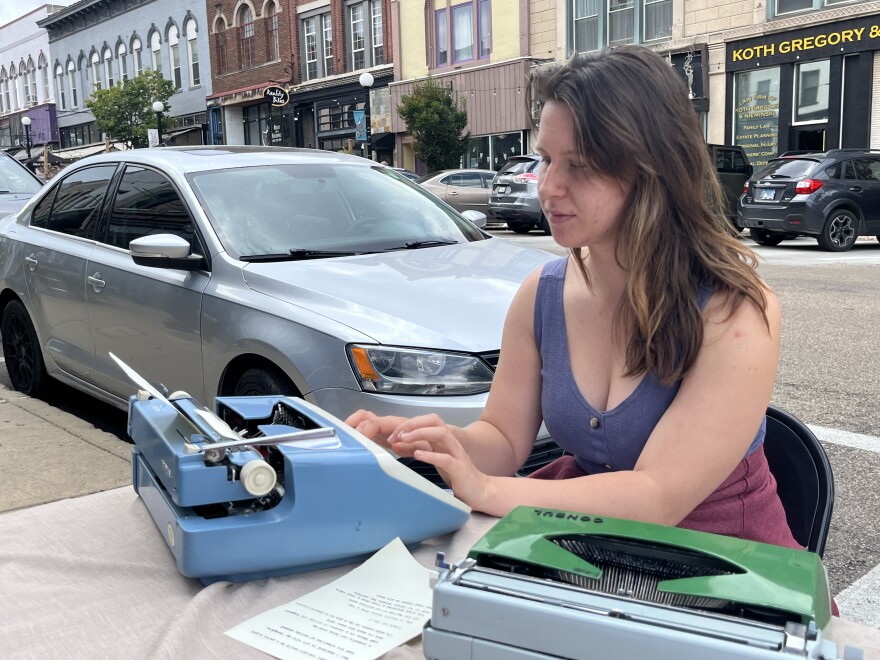Athena Pajer of Bloomington uses typewriters to craft custom poetry outside a Downtown Bloomington bookstore for tips. It’s an unusual business model.
“A turtle wakes from a nap at the bottom of an ancient pond. The wind disturbs a leaf from a tree above, and as the turtle breaks the surface, the leaf lands on his nose,” Pajer tapped on a cream-colored thick stock paper.
Pajer [pronounced PIE-er] said at the beginning of summer she was really bored, felt disconnected from her roots in literature, needed extra money, and was trying to internalize her mom’s lessons about entrepreneurship. Combining all those was a challenge.
“I kind of took a drastic measure and bought typewriters, and they're kind of expensive, so there was no going back. I need to do something with these typewriters,” said Pajer.
She picked typewriters for this new venture because there’s something about putting the ink on the paper and not having the ability to take it back the same way you can on a computer. Sure, there's correction tape, but generally once the letter is on the page it’s there. Permanence matters. Pajer said it’s liberating.
“We live in an age with a lot of anxiety and over-editing, and we doubt ourselves a lot, and whenever you're typing on a typewriter, especially for somebody, you are as truthful as you can be right away. And that's pretty powerful,” said Pajer.
She said that’s good for the craft of poetry. The authenticity makes a difference.

Communication theorist Marshall McLuhan famously said “the medium is the message” because technology influences the scale and form of human connection. McLuhan’s ghost is probably faintly smiling at this point because for Pajer the medium does shape the message.
“It's a different type of poetry than writing with a pen and paper alone. What we're doing is writing with typewriters in a very public setting. We are interacting with people, and it can be kind of overwhelming, kind of over stimulating, in a way, but it gives an energy of life to the poem,” said Pajer.
Writers yearn to impact people with their words. Pajer said something about using the typewriter, seeing the font on the page, and feeling the nostalgia of these antiquated machines brings out emotions in her audience too.
“Some people smile when they see their poem, and some people we've made people cry, sometimes tears of joy. Sometimes it just brings up a lot for people, and that's pretty special,” said Pajer.
On this day, Pajer is up to 10 poems in about three hours.
She takes cash or Vemno.
“I just start typing away, writing something usually it's a haiku piece, and I start to lay the poems out in front of me. I let the sound of the typewriters go through the street, and that piques people's curiosity, and then they kind of slowly start to trickle up to me and start asking, 'Hey, what's going on?'" said Pajer.
Almost always a child walks by and asks to try the typewriter. She lets them.
After a while, Pajer said she has a collection of poems that please her. Before she sends them off with the people who stop, she takes a picture so she can collect them as she goes.
Letting the poems loose in the world, she said, adds to humanity, one drop of ink and one key snap at a time.
“Having art in a public setting is incredibly important, just for people's well-being. I think having our literature being accessible in a community is a sign of strength and openness in communities, and we need that desperately,” said Pajer.
A woman came by to pick up a poem Pajer wrote for her infant daughter. She declined an interview but agreed to have Pajer give voice to the work.
“Toddling along, please, know you're loved, even when you stumble, and I am not there to kiss your scraped knee. Please know I care. As the wind catches your hair on a sunny day, I am reminded of all the dreams you made come true, my beautiful pearl. Please know our love will always be true. So, toddle around the world with your precious smile and bring your heart with you too, because the world needs more like you,” she wrote.
Pajer also got some friends involved in typewriter poetry. They’re now doing the same thing in other cities.
“They were like, OK, let's do this thing,” said Pajer.
Pajer owns seven functional manual typewriters, a couple more electrics, and one broken one from the year 1908 she just can’t let go. They are expensive to repair. She had two with her when WGLT came to visit. One was a powder blue Royal. The other a green Consul. She declined to name a favorite.
“They're my children. I can't say that in front of them,” said Pajer.
One of the typewriters has a lot of ink on its ribbon. The letters clump thick and moist on the page. The other has keys that produce a lean cursive script. Pajer favors the inky one to write haiku.
"Because it reminds me of just Asian calligraphy. That's kind of a personal choice, but sometimes, whenever I come to different locations, if I'm by myself, I will bring as many typewriters as I can carry,” said Pajer.
She said the weight of the keys or the font or something else about them each might inspire a different style of poetry to match with people who hunger for words.


